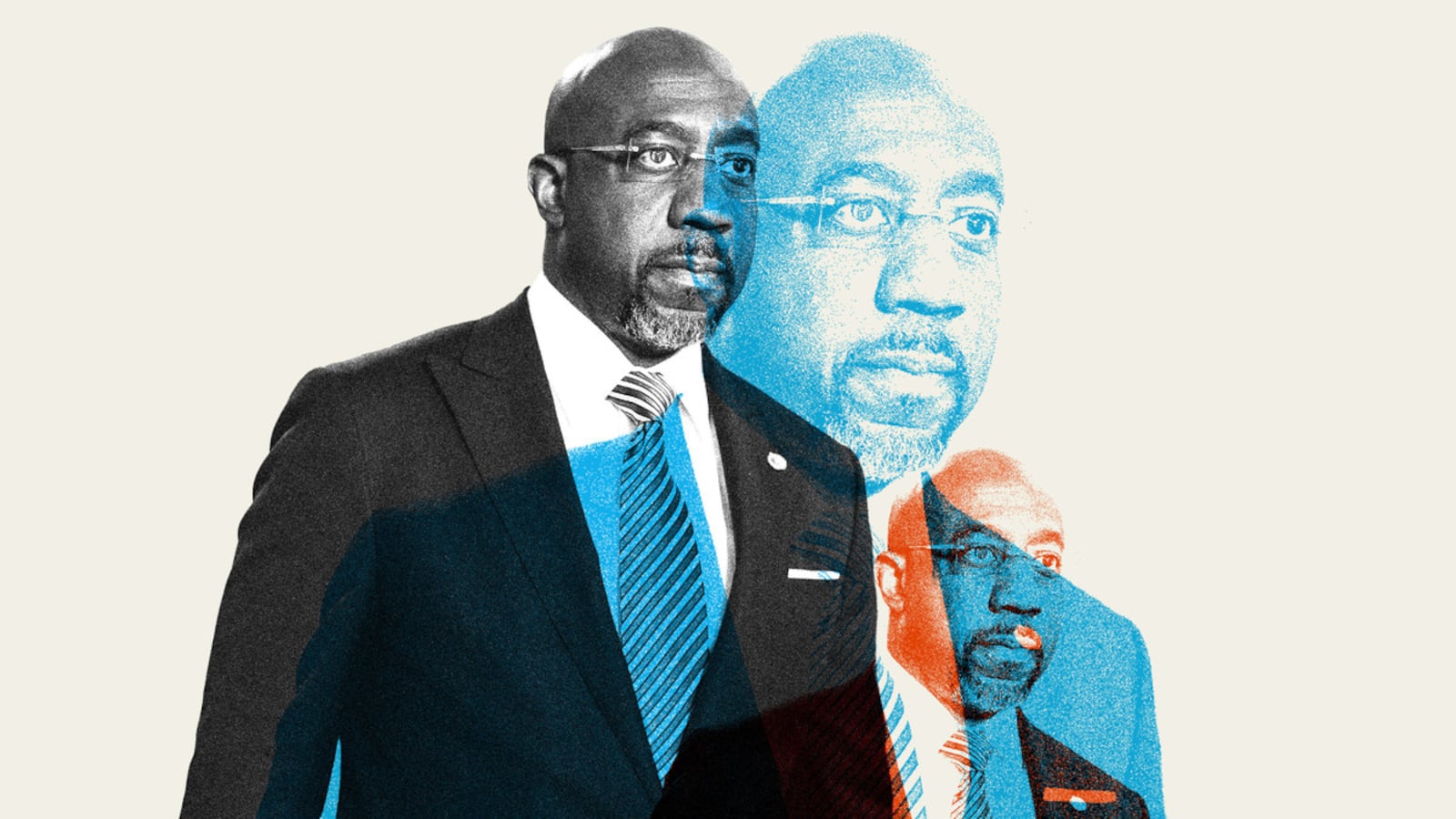No matter which party comes out victorious in Tuesday’s runoff contest in Georgia, Democrats are already guaranteed to control the U.S. Senate for the next two years.
But the battle between Sen. Raphael Warnock (D-GA) and Herschel Walker actually has major implications for the balance of power in the chamber over the next four years.
If holding the Senate in 2022 was a hard task for Democrats, doing it in 2024 would be herculean. The map confronting Democrats in the upcoming cycle is one of the most outright brutal in recent memory: they’ll be forced to defend seats in a trio of states that Donald Trump easily won in 2020 and defend five more in the country’s marquee battleground states.
A Warnock victory on Tuesday would provide critical insurance for Democrats, boosting whatever slim chances they have of holding the chamber in two years or, at the very least, making a preemptive dent in a GOP majority.
For Republicans, meanwhile, a Walker win would essentially kick off their 2024 cycle with a win, and they would only need to flip one of two states that Trump won by double digits—West Virginia and Montana—to secure a majority.
“A win in Georgia will give Democrats a little spring in their step,” said Jim Manley, a former top aide to the late Harry Reid, the longtime Senate Democratic leader.
“The math is brutal, and starting right now, each and every one of these folks up for re-election is going to be looking over their shoulder worrying about re-election,” he said. “It gives Democrats some hope at a time when we need all we can.”
An extra Senate seat will also be a critical boost for Democrats in the short term: with 51 seats, they will have an outright majority, meaning Majority Leader Chuck Schumer (D-NY) will not have to broker another power-sharing agreement with Minority Leader Mitch McConnell (R-KY). In 2021, that process took weeks.
And while Democrats lost the House, in the Senate, 51 seats means a smoother time confirming federal judges and administration appointees, as well as more control over committees.
Although the 2024 machinations are already in effect, Tuesday’s election marks—at long last—the official end of the 2022 election season. That it will wrap in Georgia is somewhat fitting: the race between Walker and Warnock has been among the most expensive, hardest fought, and bitterly personal races anywhere in the country.
The result of the November election reflected the broader dynamics that made 2022 a better-than-expected, but still not great, year for Democrats. Warnock led Walker by a percentage point—less than 38,000 votes, in fact—but he failed to reach the 50 percent threshold for an outright win.
In Georgia and elsewhere, Republicans nominated flawed, first-time candidates—usually backed by Donald Trump—to take on battle-tested Democratic candidates.
Nowhere was that contrast clearer than in Georgia. Warnock, a pastor who preaches at Dr. Martin Luther King Jr.’s pulpit in Atlanta, is among his party’s most skilled campaigners, and prevailed in a hard-fought runoff just two years ago.
Walker, meanwhile, leveraged Trump’s support and his profile as a Georgia football legend for a blowout primary win in his first run for office. Since then, he’s been dogged by a number of scandals, from revelations that he paid for women to obtain abortions, to allegations of violence by an ex-girlfriend, to reporting indicating that he claimed a tax break in Texas while running for Senate in Georgia.
Many expected the headwinds of inflation and Joe Biden’s unpopularity to boost even weak candidates over the finish line. While it may have helped Walker, it wasn’t enough to get him over the finish line in November—and may not be enough now. On the eve of the runoff, Republicans have been publicly and privately pessimistic about the football star’s chances of winning.
If Georgia voters were to re-elect Warnock, it would provide one final, and very stinging, rebuke to the former president, just as he kicks off his third campaign for the White House. A Walker defeat would be certain to launch another round of the post-election finger-pointing that bedeviled the GOP and sparked an open feud between McConnell and Sen. Rick Scott (R-FL), the party’s campaigns chief.
But, true to this battleground state’s recent history, Peach State voters are unlikely to deliver any knockout punches. The runoff is expected to be a close one, even if Warnock is a slight favorite, and it’s still very possible Walker pulls it out. There were more than 80,000 Georgians who voted for the Libertarian candidate, Chase Oliver, in the general election, and there’s no telling who shows up for a runoff.
The handful of polls that have been released during the four-week runoff period have shown Warnock with a slight lead over Walker. Early voting data has also shown an advantage for the Democrat: some 1.8 million Georgians have cast their votes already in the runoff, with many of those votes concentrated in heavily Democratic counties in the Atlanta area. The early bloc has also had a high share of Black voters, another encouraging sign for Warnock.
But Democrats were expected to perform well in the early vote. The key for Walker will be if a massive turnout at the polls on Tuesday eats into Warnock’s lead. Erick Erickson, the influential Georgia-based conservative pundit, tweeted on Monday that Warnock “has all the advantages” and predicted a Democratic victory, but cautioned that “the data suggest a close race that Walker could win.”
From the outset of the runoff campaign, the advantage seemed to be Warnock’s. While the senator was the only statewide Democrat in Georgia to get more votes than their GOP opponent, Walker underperformed Gov. Brian Kemp on Nov. 8 by a 200,000-vote margin. Faced with the prospect of electing one of the most scandal-plagued major candidates in recent memory, many Kemp supporters either pulled the lever for Warnock or simply didn’t vote in the race at all.
The fact that Senate control no longer rests on Georgia deprives Walker of his strongest selling point. And it could dissuade those who held their noses and voted for him in November from doing so again.
Forced to expand on his pitch, Walker has grown more muddled in the final weeks of the race. Asked by Politico about a potential lack of Republican enthusiasm for his candidacy, Walker appeared confused—incomprehensible, at least—about the office he is seeking. He said voters “know right now that the House will be even so they don’t want to understand what is happening right now.”
“You get the House, you get the committees. You get all the committees even, they just stall things within there,” Walker said. “So if we keep a check on Joe Biden, we just going to keep a check on him.”
While Walker’s gaffes and his relatively light campaign schedule have caused alarm among Republicans, Warnock has campaigned with celebrities and key party figures. Former President Barack Obama headlined a rally for the senator last week in Atlanta. (Notably, both Trump and Biden did not campaign in Georgia during the four-week runoff period.)
In his stump speeches, Warnock has hewed closely to a careful but progressive message, emphasizing his positions on reducing the cost of prescription drugs and his work with Republicans during his two years in the Senate. In campaign ads and on his social media accounts, however, Warnock increasingly took a confrontational approach toward Walker, criticizing his scandals and personal behavior far more directly than he had in the past.
Warnock, a veteran of three hard-fought elections in Georgia over three years, appeared to take nothing for granted on the eve of his fourth.
On the campus of Georgia Tech in Atlanta on Monday, Warnock appeared with fellow Sen. Jon Ossoff (D-GA) and Rep.-elect Maxwell Alejandro Frost (D-FL) for a rally geared to young voters.
“We’ve got one more day to bring this thing home,” Warnock told students. “I want you to vote like it’s an emergency.”










